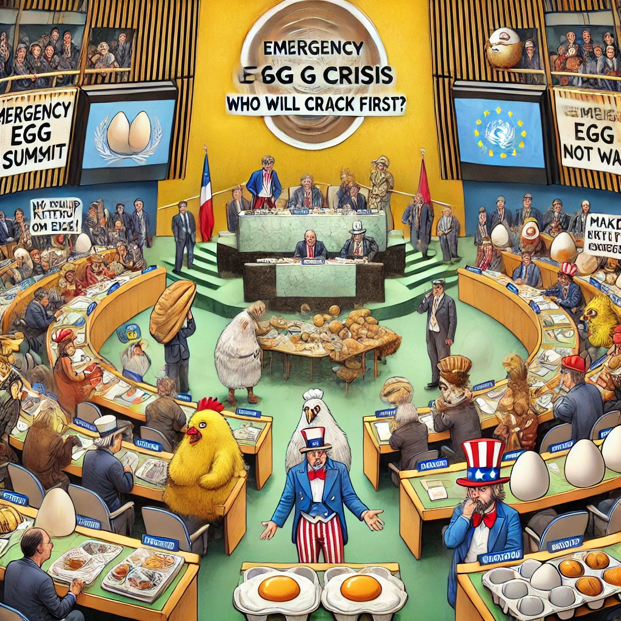What the food crisis says about our global markets (and why it concerns you)

Satirical disclaimer: This article alternates between serious analysis and deliberate second degree. Read between the lines, and beware of overly smooth eggs.
1. An unexpected crisis… that is costly
Since late 2024, the United States has faced a historic avian flu outbreak: over 30 million laying hens culled, empty shelves in supermarkets, and a price surge of +65% on eggs, with further increases expected in 2025.
Faced with this situation, Washington turns to foreign countries, especially Europe, to secure imports. But Brussels does not see it that way.
2. Europe says no: food sovereignty before solidarity
While some European countries have export capacities, the European Union remains reluctant to deliver massively.
The reasons are multiple:
• Sanitary standards incompatible between the two continents,
• Willingness to protect the domestic market,
• Underlying trade tensions with the United States over agricultural products.
"It's not our job to correct the structural failures of the American system." - Statement from a European diplomat on condition of anonymity.
3. What this crisis reveals about the global economy
Behind this story of eggs lies a deeper reality:
• The fragility of supply chains,
• The interdependence of economies,
• The growing risk of essential goods becoming political levers.
We saw it with cereals, gas, and rare metals.
Today, it's the turn of eggs.

4. [SATIRE] The UN calls for an Egg Summit
From here, the analysis becomes intentionally satirical. Any resemblance to real events is purely... plausible.
In a world on the brink of collapse, the United Nations convenes an "Emergency Egg Summit".
Uncle Sam, starving, begs for eggs to save American brunches.
France, baguette in hand, refuses to sacrifice its organic hens.
A European hen in a suit and tie proudly sits on the security council.
China, stoic, offers synthetic eggs produced en masse.
Outside, protesters chant:
"No ketchup on omelettes!", "Make brunch, not war!", and "Eggs for all, not for the elite!"
5. The tokenization of resources: fiction or near future?
What if the egg crisis was just the beginning?
In a world where goods are becoming scarce, the tokenization of real resources (food, water, energy) makes sense.
• Inflation, logistics, geopolitics: food crises impact commodities, markets... and therefore, cryptos.
• Stablecoins and tokens linked to the supply chain (like HBAR) are gaining traction in this context.
Projects like Hedera Hashgraph (HBAR) are already preparing for it:
• Thanks to its fast, secure, and low-energy technology,
• Hedera enables the creation of tokens representing physical assets (e.g.: sustainability certificates, energy units, agricultural products...).
• Blockchains could play a role in the traceability of agricultural products or the tokenization of strategic goods.
What if tomorrow, a token represented 1 dozen certified organic eggs from the EU?
A stablecoin backed by a dozen eggs? Utopia yesterday, credible hypothesis tomorrow.

Conclusion: the egg, a mirror of a strained system
The egg war is both a gag and a warning signal.
A simple, basic product becomes the symbol of a world under pressure.
What if tomorrow, it were butter? Bread? Or worse yet... coffee.
